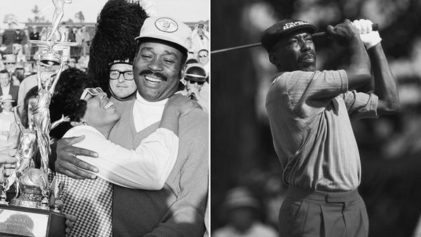Tiger Woods returns to golf this week in Arizona, and questions come to mind: Do we really care anymore? Better yet, is he worth us caring?
Woods has sort of meandered his way around the PGA Tour the last several years (when healthy), raising hope that he could return to form and resume his pursuit of Jack Nicklaus’ record of 18 major championships. But he has seriously faltered.
Along this path to nowhere Woods has maintained the largest Black fan base of any golfer in history, a collection of loyalists he hardly acknowledges.
Black fans show up at tournaments he plays, wearing his Nike-made golf shirts and hats, proud that he represents them, begging for an acknowledgment from him, a simple nod of the head that Blacks share in spaces where they are outnumbered, a quick smile or just eye contact. In response, they get…nothing.
No doubt, Woods has this laser-like focus inside the ropes, a concentration that was an important element in his 14 major championship wins and overall dominance that places him among the top, if not at the top, of golf’s greats.
But he’s disconnected from his late father’s side of his heritage and only acknowledges his Blackness when it is convenient for him, as in when historical context is involved. Otherwise, forget it.
Some would argue (weakly) that Woods does not have to acknowledge his race. In America, he can live his life as he pleases. And of course that’s true. But his relevance to Black people who want to see him do well solely because he is Black does not have to continue.
Throughout history, African-Americans have been a most forgiving people. Their loyalty to their kind can be exhausting, even if the love offered is not returned. This is one of those cases.
Woods has done very little to earn the support from the community he shuns. His “I’m just a golfer” disposition rings hollow. When Venus and Serena Williams, for example, threatened to shun playing in South Carolina until it removed the confederate flag—a symbol of the ugly remnants of slavery and the Jim Crow South—Woods said he did not have a position on the matter. When he was asked about his Blackness, he called himself a “Cablinasian.”
But when he’s called the first Black golfer to win the Masters, there is no resistance to the platitude.
And yet, if/when he wins again, even those who are dismayed at his disconnection will bask in his success.
There is no certainty he will have any more success on the PGA Tour, which is quite a statement, considering there was a time when him not winning a tournament was significant news. Hardly anyone expected him to rebound quickly after his rampant philandering became public knowledge five years ago on Thanksgiving.
He went through the typical protocol for busted celebrities, including going to rehab for sex addiction (wink, wink). The wife left him, his health deteriorated and he eventually wormed his way back on tour and into society.
Since then, he has won tournaments, but no majors. He has not been able to hit his driver straight in the biggest events or make par-saving putts that were the key elements to his previous extraordinary success.
His father, Earl Woods, had said something considered preposterous before his son even won on the PGA Tour—that Tiger Woods would change the world.
Woods has not been that important—only Muhammad Al as an athlete has made that kind of an impact, and maybe the late tennis great Arthur Ashe. But Earl Woods was half-right: His son changed the golf world.
He dominated it to the point where pundits wondered in their publications if it was good for the sport that he won at such a high rate. That concern was born of a discomfort with a Black man crushing a traditionally white sport, pure and simple.
Anyway, Woods changed golf in this way: He was among the few players who trained for the sport, who kept his body in shape for longevity purposes. Now, almost all golfers have personal workout gurus to strengthen their bodies.
Also, African-Americans—men and women—watch golf now, when he’s playing at least. Or they at least care about golf as it relates to him. Golf courses around the country see Blacks playing recreationally in more numbers than ever, many inspired by Woods’ long-time success.
He has inspired an entire generation of young, new golfers without even trying, by just being a Black man who excelled at the perceived exclusionary sport.
He’s also, in a very real way, let down those Blacks who have supported him by not returning the affection. So his first appearance of the year on tour Thursday does not move the needle as it has in the past. Sure, there is curiosity to see the reported weight loss, his professed straightening up of his driver and how good a job the dentist did on his front teeth that were damaged by a camera man last week at a meet of his girlfriend, skier Lindsey Vonn.
But he hasn’t earned much more than our curiosity. He’s lost his wow factor as a golfer and respect as a man the African-American community once proudly held up as one of their own. Now, he’s just another guy on the PGA Tour trying to win.


